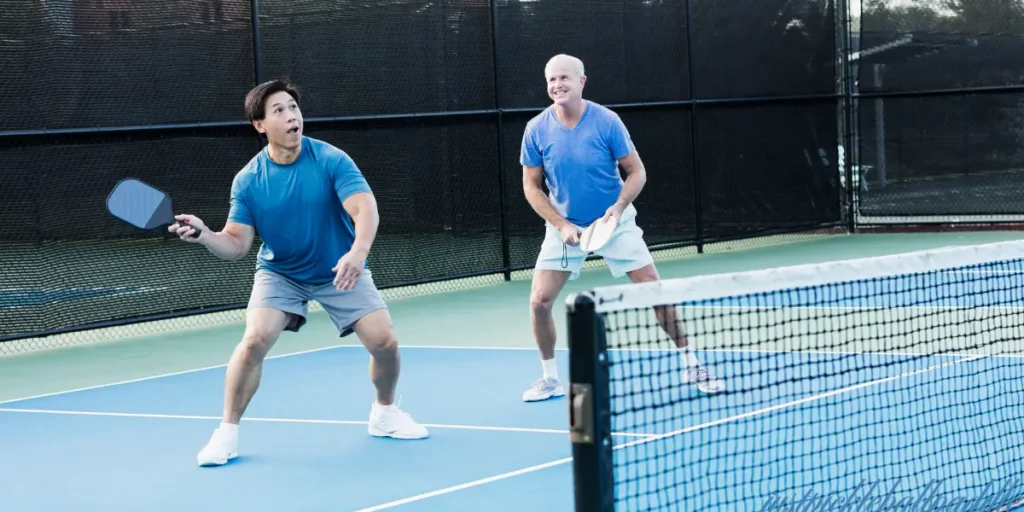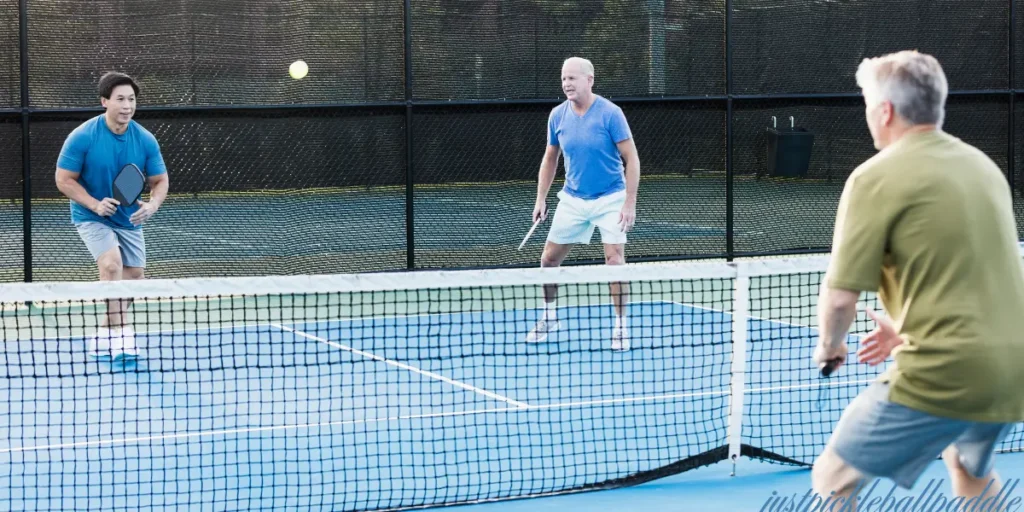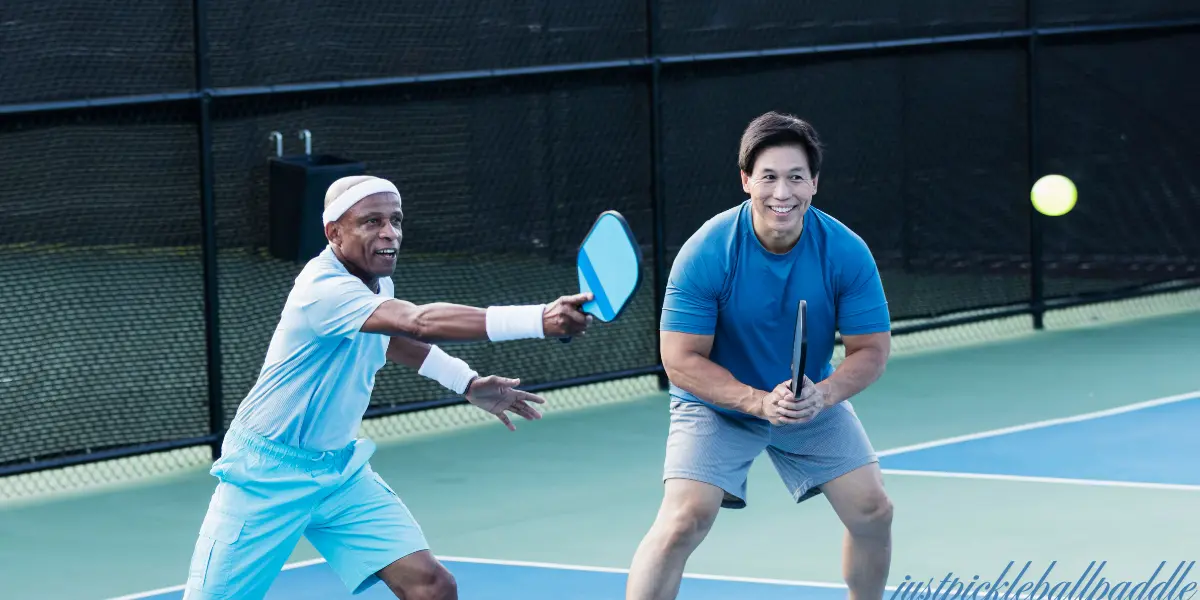Have you ever found yourself in a fast-paced rally, only to wonder if hitting the pickleball twice on the same shot is allowed? This common scenario can leave players debating the rules mid-game.
Understanding the rules surrounding double hits is crucial for improving your technique and staying within the boundaries of fair play.
In this guide, we’ll cover everything you need to know about hitting the pickleball twice on the same shot, including when it’s legal when it’s not, and how to avoid this common mishap.
What is a Double Hit in Pickleball?
A double hit in pickleball refers to the situation when the ball makes contact with the paddle twice in the same shot. This can happen when:
- A player’s stroke unintentionally causes the ball to bounce on the paddle twice.
- A player makes a quick follow-up contact in an attempt to control or redirect the ball.
- During fast exchanges, the paddle momentarily “carries” or pushes the ball instead of hitting it in a clean motion.
Double hits are different from “carry shots,” which happen when the ball is not struck cleanly but is instead pushed or dragged along the paddle surface.
Both types of hits have specific rules in pickleball, and understanding these distinctions is crucial to avoiding unnecessary faults and maintaining fair play.
Can You Hit the Pickleball Twice on the Same Shot?
The answer is both yes and no – it depends on the circumstances. According to the USA Pickleball Rulebook, a double hit is allowed if it’s accidental and occurs as part of a single continuous motion, with no attempt to control the ball through a second deliberate strike. Here’s how the rule works:
| Type | Scenario | Legal/Illegal |
|---|---|---|
| Single Motion | The ball grazes the paddle twice in a single swing. | Legal |
| Separate Hits | The player strikes the ball again after the initial contact. | Illegal |
Legal Double Hit
A double hit is considered legal if the ball makes contact with the paddle twice during a single, unintentional stroke.
In fast-paced rallies, it’s common for the ball to bounce off the paddle twice if a player reacts quickly to a powerful shot. As long as this occurs within one fluid motion and isn’t intentional, it’s typically allowed under the rules.
Example: If a player attempts a return shot and the ball unintentionally makes two quick contacts with the paddle, this is seen as accidental and therefore legal. This rule ensures players aren’t penalized for slight mishits during rapid exchanges.
Illegal Double Hit
A double hit becomes illegal if a player intentionally tries to make a second contact with the ball, typically to control or redirect it.
For example, if a player swings at the ball, makes contact, and then taps it again in a separate motion to adjust its direction or speed, this is considered an intentional double hit.
This type of hit violates the rules and results in a fault, granting the opponent either a point or the serve, depending on the game’s status. This rule is designed to ensure fair play by requiring each shot to be completed with a single, continuous motion.
Rules from the Official Pickleball Rulebook
According to Rule 11.A of the Official Pickleball Rulebook by USA Pickleball.
“The ball can be hit twice, but that must happen during a continuous, single-direction stroke by one player. If the stroke made while performing the serve or during a rally is not continuous, or not in a single direction, or the ball is struck by a second player, it is a fault.”
This rule clarifies the conditions under which a double hit is considered legal or illegal.
Scenarios Where Double Hits Might Happen in Pickleball
Double hits can happen in various situations during a pickleball game. Here’s a closer look at some typical scenarios:

Accidental Double Hits
These occur when players react swiftly to fast shots, leading to an unintentional second contact on the paddle.
For example, in intense rallies, a quick defensive move might cause the ball to deflect twice. As long as it happens in one smooth motion, it’s generally allowed under the rules. Accidental double hits keep the game fair without penalizing players for minor mishaps.
Intentional Double Hits
At times, players may attempt a second, controlled hit to direct the ball, especially in challenging spots near the net.
For example, a player may feel tempted to tap the ball again to regain control. However, these deliberate double hits are considered faults, as they violate the rule against multiple, intentional contacts within a single shot.
Simultaneous Hits by Two Players in Doubles
In doubles, both teammates might reach for a shot and accidentally hit the ball at the same time. This can happen during quick exchanges near the net.
As long as the simultaneous contact is accidental and doesn’t give the team an unfair advantage, it’s generally allowed. Good communication between teammates helps avoid these situations and keeps the play smooth.
Consequences of Hitting the Pickleball Twice in One Shot
The impact of a double hit depends on whether it’s deemed legal or illegal under the rules.
Legal Double Hit: When the double hit is accidental and occurs within a single, continuous motion, it’s considered legal.
In this case, play continues as normal with no penalties, and players are not penalized for unintended mishits that don’t disrupt the game’s integrity. Legal double hits allow the game to proceed smoothly, especially during fast-paced rallies.
Illegal Double Hit: If a player intentionally hits the ball twice, or if there’s a noticeable pause or separate motion in the double contact, it results in a fault. In this case, the opponent either scores a point (if they are the receiving team) or gains control of the serve.
Illegal double hits emphasize the importance of maintaining a fair shot without attempting to control the ball in a second action.
Referee Role in Tournaments: In tournament play, referees monitor for potential double hits. Referees observe closely to decide if a double hit was accidental or intentional, calling faults when they see a separate second attempt or intentional double contact.
Their judgment ensures the game adheres to official rules, and players rely on referees to enforce fair play during competitive matches.
Tips to Avoid Double Hits in Pickleball

To reduce the risk of unintentional double hits, players should focus on improving their technique and timing through practice. One effective way is by working on making smooth, single-contact strokes.
By practicing controlled, fluid paddle movements, players can develop muscle memory that minimizes the chance of the ball contacting the paddle more than once. Starting with slow, deliberate strokes and gradually increasing speed helps build consistency and reduces the risk of accidental double hits.
Another important factor is enhancing timing and reaction skills. Pickleball rallies often involve fast-paced exchanges, so quick reactions are essential.
By practicing reaction drills, such as wall bounces or partner drills, players can sharpen their timing and better control their paddle during rapid shots. Improved reaction skills allow for more precise paddle movements, reducing the likelihood of hitting the ball twice unintentionally.
Additionally, improving paddle control is crucial, especially when dealing with high-speed shots or spin. Learning how to control grip strength and adjust the paddle angle can help players avoid double hits.
Practicing with different types of shots, like spin or fastballs, enhances a player’s overall paddle control, allowing them to strike the ball more effectively without making multiple contacts.
FAQs
If two players on the same team hit the ball simultaneously in doubles, it is considered legal as long as it’s accidental. The point continues without penalty, provided no advantage is gained from the simultaneous contact.
An illegal double hit occurs when there is a deliberate second contact or a noticeable pause between the two hits. If the paddle strikes the ball twice in a way that seems intentional or interrupted, it is deemed a fault and the rally is lost.
While double hits are addressed in the official rules, recreational players often adopt a more relaxed approach, allowing accidental double hits to slide. That said, following the official guidelines ensures fair play and improves consistency for those transitioning to competitive play.
Yes, players can challenge an illegal double hit during a tournament by appealing to the referee. The referee will assess the situation based on their observation or review. Keep in mind, however, that the referee’s decision is final and cannot be overturned.
Double hits are uncommon at the professional level due to players’ refined paddle control and quick reflexes. However, they occur more frequently among beginners or recreational players as they develop their skills and timing. Understanding the rules can help reduce these faults over time.
Related Post
- Can You Hit or Serve Overhand in Pickleball
- Can You Spike in Pickleball
- What is a Volley in Pickleball
- Can You Touch the Net in Pickleball
Conclusion
Understanding double hits in pickleball is essential for maintaining fair play and improving your game. While accidental double hits are allowed if they occur in one continuous motion, intentional double hits are considered faults and result in penalties.
By practicing smooth strokes, enhancing reaction times, and improving paddle control, players can reduce the likelihood of accidental double hits and stay within the boundaries of the game’s rules.
Whether you’re a beginner or a seasoned player, keeping these tips in mind will help you avoid costly mistakes and keep the game flowing smoothly.

